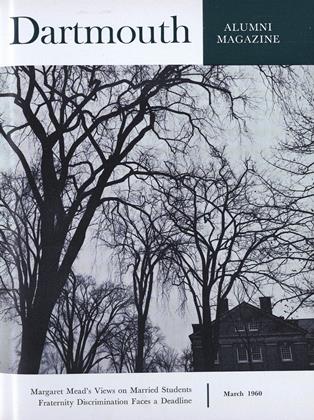Peter Day '35. Greenwich, Conn.: Seabury, 1960. (TheSeabury Lenten Book for 1960.) 136 pp.$2.50.
"April is the cruellest month," said T.S. Eliot, for spring makes new demands upon us. The lengthening of the day means more prolonged and more intense effort; and most people just try to grin and bear the recurrent rigors of the "lengthening" or "lenten" season. Not so the joyous author of this lenten volume; and the secret of his spirit is that for him the season is not just a task but a gift. He is a religious man, not just a denominational Christian. His Saints on Main Street are not stereotypes; life is full of divine surprises, and they are able to do things for other people that surprise everybody including themselves.
This is a book by a layman (a Dartmouth man who is now editor of that distinguished Anglican weekly The LivingChurch), and its primary audience will be those "consciously and thoughtfully practising Christians" whom Eliot called "the Community of Christians." But it can also be a real stimulus to all of us who are interested in the Idea of a Christian Society, and in Anglican contributions to its realization. Indeed, Mr. Day's book serves as a welcome corrective to Mr. Eliot's over-praise of Christians who possess "intellectual and spiritual superiority." There is no touch that I can see in Mr. Day's book of Eliot's doctrine of the Superior Man.
On the other hand, I hope Mr. Day will go on to write a sequel to this volume, which would deal more systematically with the role of the Christian in public affairs. I would like to see him wrestle with Mr. Eliot's sober view that "even if all persons in positions of the highest authority were devout and orthodox Christians, we should not expect to see much difference in the conduct of affairs."
Mr. Day is surely too pessimistic in saying that "the relevance of the New Testament to the predicament of twentieth-century man' consists largely in "suggestions about what to do while you are waiting for ... somebody to make the final mistake in international affairs." Yet at other times he is too optimistic; at least I get the feeling that in his view the world can be transformed into active parishes of the Christian Church, an illusion scarcely fostered by the Gospel (which doubts that Christ will at his return find faith on the earth).
What Mr. Day's present book can, and I am sure in many cases will do, is two things: take away the sense of joyless effort which pervades so much of the pre-Easter season, and turn many staid and all-too-static Churchmen into sharers in a dynamic Christian fellowship.
 View Full Issue
View Full Issue
More From This Issue
-
 Feature
FeatureProfessor Jesup's Herbarium
March 1960 By JAMES P. POOLE -
 Feature
FeatureFraternity Discrimination Faces a Deadline
March 1960 By THOMAS E. GREEN '60 -
 Feature
FeatureAre Marriage and College Compatible?
March 1960 By MARGARET MEAD -
 Feature
FeatureLife with a Teen-Age Gang
March 1960 By ROBERT I. POSTEL '60 -
 Article
ArticleThe Mission of Liberal Learning
March 1960 By PRESIDENT JOHN SLOAN DICKEY -
 Class Notes
Class Notes1918
March 1960 By THOMAS E. SHIRLEY, W. CURTIS GLOVER, ROBERT FISH
Books
-
 Books
BooksNORTHERN LIGHTS: WRITERS FROM THE UPPER VALLEY OF VERMONT AND NEW HAMPSHIRE.
June 1974 By CLAUDE G. LIMAN '65 -
 Books
BooksVARIETES MODERNES
July 1952 By Francois Denoeu -
 Books
BooksSOMMETS LITTBRAIRES FRANÇAIS.
June 1957 By HUCH M. DAVIDSON -
 Books
BooksTHE VALUE ISSUE OF BUSINESS.
JUNE 1967 By JAMES BRIAN QUINN -
 Books
BooksPLATICAS Y TEMAS SOBRE LA AMERICA ESP AN OLA
May 1952 By R. A. Casas -
 Books
BooksREFLECTIONS ON THINGS AT HAND, THE NEO-CONFUCIAN ANTHOLOGY, COMPILED BY CHU HSI & LÜ-CHTEN.
NOVEMBER 1967 By T.S.K. SCOTT-CRAIG

